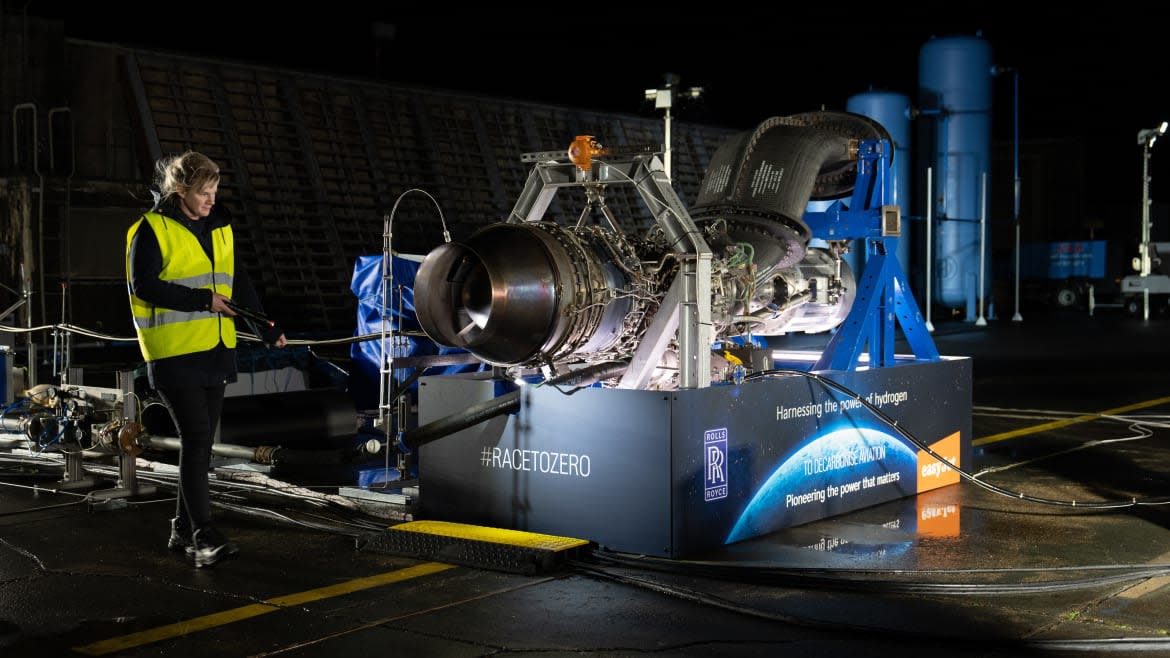Rolls-Royce Hits Green Milestone with Hydrogen Plane Engine Test

Rolls-Royce just achieved a major milestone in the quest to decarbonize air travel, after successfully testing an aircraft engine that runs on hydrogen fuel for the first time ever.
The British automaker conducted the ground test using a Rolls-Royce AE 2100-A airplane engine, which runs on hydrogen fuel generated from wind and tidal power. The engine was built in partnership with easyJet in order to address shortcomings in the airline industry when it comes to greenhouse gas emissions. Both companies are now planning a second set of tests with the goal of eventually using an engine on a flying aircraft.
“The success of this hydrogen test is an exciting milestone,” Rolls-Royce Chief Technology Officer Grazia Vittadini said in a statement. The milestone and the goal of decarbonizing air travel, she added, “could help reshape the future of flight.”
This Might Be the Start of a Hydrogen Fuel Revolution
While it’s still very early, the successful test of the engine does offer a lot of promise for an industry that is notoriously awful for the environment. Some estimates have found that a single long-haul flight churns out more carbon emissions than a person generates in a year. The FAA says that they handle more than 16 million flights a year—which means a whole lot of fossil fuel emissions from conventional jet fuel.
However, hydrogen wouldn’t have that issue since it doesn’t emit greenhouse gasses. That’s why researchers believe that it can be a viable energy alternative for everything from planes, to trains, to automobiles. At scale, it can help drastically reduce the amount of carbon emissions produced by transportation.
But there’s a catch: It’s really tough to make completely green hydrogen fuel. The process involves taking water and zapping it to split the hydrogen from the oxygen. Unless the energy used to create the hydrogen comes from a renewable source, it’s not entirely green and therefore bad for the environment.
Rolls-Royce claims they have solved this by creating “green energy” using renewable energy from a hydrogen production and tidal test facility in the Orkney Islands, U.K.. But it is just one plant. There’s little indication that something like this could be created at the scale required in order to produce enough hydrogen fuel for the entire airline industry alone, let alone all of transportation.
It’s still going to take a while to get there. Foundational, industry-wide changes don’t happen overnight after all. "Hydrogen is absolutely a solution, but it's not for tomorrow morning because the changes to be done in design are so massive that it's going to take more than one generation of airplanes to get there," Eric Schulz, chief executive of SHZ Consulting and a former Rolls-Royce and Airbus executive, told Reuters.
Still, the engine and its successful test is a major step forward in the eventual goal of decarbonizing an industry that desperately needs it.
Got a tip? Send it to The Daily Beast here
Get the Daily Beast's biggest scoops and scandals delivered right to your inbox. Sign up now.
Stay informed and gain unlimited access to the Daily Beast's unmatched reporting. Subscribe now.

 Yahoo Movies
Yahoo Movies 
